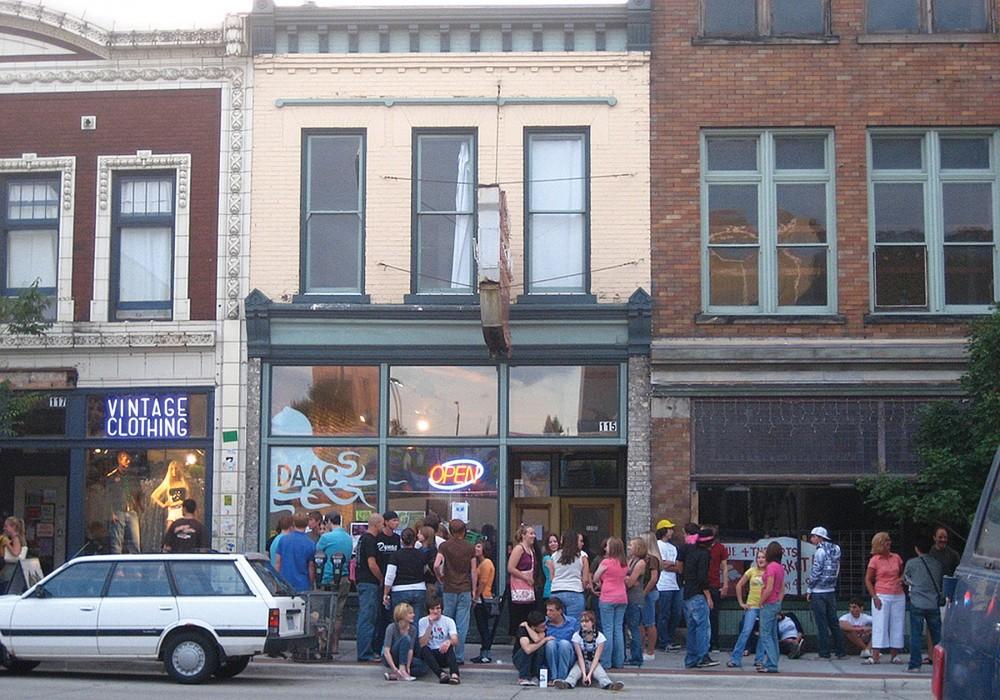DAAC implements crowdfunding campaign

Courtesy / DAAC The outsie of the building that formerly housed the DAAC.
Jan 30, 2014
After its sudden eviction last July, some people may have thought that was the end of the Division Arts Avenue Collective. But with the implementation of a crowdfunding campaign, DAAC board members have not given up the search for a new location.
“With the majority of the music industry relying more on alcohol sales, audiences under 21 across the country are being routinely shut out of live music,” said Mike Wolf, a DAAC board member. “As organizers and music fans ourselves, we think that it’s bogus to exclude anyone because of arbitrary factors like age.”
The Division Avenue Arts Collective is an all-ages venue that hosts everything from music performances to art galleries to do-it-yourself projects. The DAAC was evicted from its home on 115 S. Division Avenue after the building was sold to Harris Lofts LLC. In January, a Rockethub campaign was put into place to raise $20,000 toward a new home for the DAAC.
“It was kind of like community-based thing. (When I was in a band), before we could play there we went to a meeting with (the board)… and introduced ourselves,” said Aaron Mace, a senior at GVSU who used to attend shows at the DAAC. “They were big on bringing people in and getting people involved — not having bands showing up, doing their thing and then leaving.”
The DAAC traditionally operated as a volunteer-powered venue, and for 10 years it was able to function without outside funds. Before the venue’s eviction, board members were discussing plans to raise money to expand programming and make improvements on the Division space.
“After we got kicked out of our venue, we spent the following weeks getting feedback from the community and meeting with local arts organizers to see what people want out of a new venue, because we just didn’t want to quit,” said Wolf, a 2011 GVSU alumnus.
Wolf began to take over “a sort of transitional lead role,” and the board continued to discuss community feedback and future goals.
“Through the help of a former professor, I was connected to an entertainment lawyer who I began meeting with to get a better grasp on potential routes to continue our work,” he said. “Through our conversations, it turned out that he was just finishing up work on a New York music festival and was looking for his next pro bono project, so we immediately signed on to work with him. Complete game changer. With his suggestion, we applied and were accepted as a fiscally sponsored project of Fractured Atlas.”
Fractured Atlas is a nonprofit service organization located in New York City. The organization offers support to independent artists and arts organizations through services such as fiscal sponsorship, liability insurance and online courses on arts-related topics.
From there, the board launched a Rockethub campaign, an online crowdfunding platform that has a partnership with Fractured Atlas.
“Traditionally with crowdfunding campaigns there is a middle man when dealing with the money,” Wolf said. “So instead of having to use a middle-man like Amazon Payments, money given on our campaign goes right to Fractured Atlas. Following that transaction Fractured Atlas sends tax receipts to the contributor. Once we go to use that money, Fractured Atlas takes a flat administrative fee.”
The campaign was initially launched on Jan. 15. The project was given forty days to reach its projected goal of $20,000 and so far has raised 19 percent of its total goal.
People who donate to the campaign have the opportunity to be awarded a number of “perks.” Gifts include homemade art such as a ceramic necklace, courtesy of an artist of the Many Hands Clay Cooperative, for a donation of $25. Other gifts are more personal, such as A Song For You, an original song written to individual donors of $500 or more.
Through the campaign, the hope is that one day the DAAC will reopen in Grand Rapids.
“There’s a lot of places where people can play music (in Grand Rapids), places where local bands can play, but the DAAC was the most welcoming,” Mace said. “It’s not a bar so it’s not trying to make a ton of money or sell out shows; (it was a) place where any local band can get involved.
“It is important for people to have a place for people who want to go see music, who aren’t there just to have a drink or something… They’re there to see the bands play.”

























